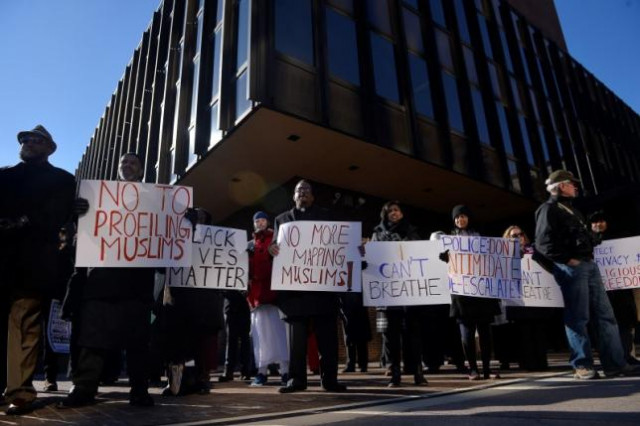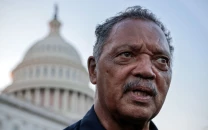Muslim groups' lawsuit over NY surveillance revived by court
US Circuit Court of Appeals in Philadelphia reverses lower court's decision to throw out case

Muslims and their supporters participate in a rally for Muslim rights outside of the James A Byrne Federal Courthouse in Philadelphia January 13, 2015. PHOTO: REUTERS
The 3rd US Circuit Court of Appeals in Philadelphia reversed a lower court's decision to throw out the case, finding the plaintiffs had legal standing to assert claims that the counter-terrorism program violated their rights.
Read: Post 9/11: NYPD's surveillance of Muslims under scrutiny
"We have learned from experience that it is often where the asserted interest appears most compelling that we must be most vigilant in protecting constitutional rights," Circuit Judge Thomas Ambro wrote for a three-judge panel, invoking the US internment of Japanese-Americans during World War Two.
A spokesman for the city's law department said the city was reviewing the ruling, which did not resolve the merits of the case.
"At this stage, the issue is whether the NYPD in fact surveiled individuals and businesses solely because they are Muslim, something the NYPD has never condoned," spokesperson Nick Paolucci said.
The program became widely known after the Associated Press reported that officers were infiltrating Muslim organizations throughout the New York region in the wake of the September 11, 2001, attacks on the World Trade Centre. Mayor Bill de Blasio ended the program in April 2014.
Read: Michigan Muslim group sues Obama, Kerry over stranded citizens in Yemen
The plaintiffs in the case, including New Jersey imams, business owners and students, sued in 2012, claiming the surveillance subjected them to discrimination, threatened their careers and caused them to stop attending religious services.
But US District Judge William Martini in Newark, New Jersey, dismissed the case in February 2014, ruling the city had persuasively argued that the surveillance was an anti-terrorism, not an anti-Muslim, program.
"There is no Muslim exception to the Constitution," said Baher Azmy, legal director for the Centre for Constitutional Rights, which represents the plaintiffs along with Muslim Advocates. The case is one of several lawsuits filed against New York over the program.
The New York Civil Liberties Union brought a similar claim in Brooklyn federal court in 2013. In addition, a group of civil rights lawyers filed papers in Manhattan federal court, claiming the surveillance ran afoul of a longstanding court order limiting how the police can monitor political activity.
Read: US Supreme Court rules for Muslim woman denied job due to hijab at Abercrombie & Fitch
Both of those disputes have been settled in principle, according to court filings. The case is Hassan et al. v. The City of New York, 3rd US Circuit Court of Appeals, No. 14-1688.



















COMMENTS
Comments are moderated and generally will be posted if they are on-topic and not abusive.
For more information, please see our Comments FAQ